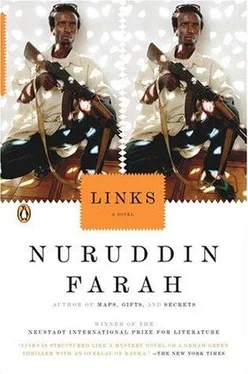The refectory was noisy. There were younger children, numbering about thirty, and adults supervising their eating. There were teenagers and young men. They sat on the floor, close to where Jeebleh and Bile were sharing a large plate with Dajaal and the driver. There were nine massive plates in all, with seven or eight people to each one.
“We’ve resorted to the traditional method of eating together daily from the same mayida ,” Bile said, “in the belief that we create a camaraderie and we’ll all trust one another. Some might consider hogwash the idea that those who look one another in the eye as they eat together are bound closely to one another. But our experiment bears it out — anyone meaning to do harm to a fellow sharer of the mayida will not dare look him, or anyone else, in the eye. Around here we say that many people prefer staying away to coming and sharing the mayida when there is bad blood. And when we share the mayida, there can be no bad blood.”
“A brilliant idea,” Jeebleh agreed.
“YOU MUST TELL ME ABOUT RAASTA AND MAKKA,” JEEBLEH SAID.
“I’ll be very pleased to,” Bile replied.
They were now back in the apartment, the light in Bile’s eyes suggesting sorrow coming home. For his part, Jeebleh was restless again. They sat on the balcony, a touch of salt in the early-evening breeze.
Jeebleh told Bile that for his own belated benefit, he wanted to know better what had happened on the day the two girls disappeared.
“We’ve been able to piece together, from talking to two women who work at The Refuge, that Makka was the first to go missing,” Bile said. “This is because something unusual occurred earlier that day. A girl around six or seven years old probably, arrived at the gate, dressed in an outfit made up of colorful beads, similar to the kind that bare-breasted Zulu maidens wear. She stood where she was for a good while, but wouldn’t come into the compound. Neither of the two women knew who she was, where she came from, who had dropped her at the gate, or picked her up when she eventually left, about twenty minutes later, walking north, vanishing into the mystery that had brought her forth. Makka saw the girl at the same time as the two women did, and soon afterward started acting like she was under some sort of spell, shaking. The two women agree that our Makka was so taken with the girl’s beads that she followed her when they were called away to attend to some problem.”
“And then what happened?”
“Makka returned, alone,” Bile said. “And a short time later, Makka went out again, apparently in search of the beaded girl. The two women remember Makka saying that she had come for Raasta, so they could go ‘play beads’ with the other girl, or something like that. And she said something about a man and a woman. Many things are not clear.”
“And Raasta?”
“Raasta was very agitated to learn that Makka had gone off on her own. And she went in search of her.”
“Then?” Jeebleh asked.
“The women saw a fancy car with tinted windows, engine running, parked at a road to the south of ours. By the time we mounted a search in the neighborhood, we couldn’t find any sign of the car. A neighbor claims to have seen one of the men. He had shades on, the kind often worn by gangsters in American films.”
Jeebleh mused aloud, as though to himself, “I wouldn’t have thought that fancy vehicles would be commonly seen in the potholed streets of civil war Mogadiscio.”
“There is such a fleet, which once belonged to the now collapsed state,” Bile said.
“Is this why everyone assumes that a warlord is behind the disappearance of the two girls?”
Bile picked his words with caution: “To spare her from worrying too much unnecessarily, we haven’t told Shanta everything we know. Only the two women and I know about the fancy car.”
A long, long silence followed.
“TELL ME MORE,” JEEBLEH SAID.
“They’re so unalike, it’s incredible,” Bile said. “But they have become completely dependent on each other, and are beginning to look alike, in their own fashion. You know the story, when a man and his wife have lived together for many years, they begin to sound alike. In fact, Raasta and Makka do sound alike, to a certain degree.” Bile paused, perhaps suddenly conscious of his natural use of the present tense, a sign of his belief that the girls were well and unharmed.
Jeebleh remained silent. He did not mention that he had spoken to Caloosha about the girls, because he wished neither to raise Bile’s hopes nor to dash them.
“Except for the day of their disappearance, neither girl does anything or goes anywhere without the other knowing about it,” Bile continued. “They’re like Siamese twins, neither makes a move without the other being there.”
“So whoever separated them on the day they went missing knew what they were doing — lure one away and you get the other,” Jeebleh guessed. “Could it have been an inside job?”
Bile wasn’t ready for speculation. “Where Raasta intimates care, Makka communicates boundless, generous love. No one knows exactly how old Makka is, or how she came to be sleeping in that room at The Dormer where I found her. She’s given to kissing, to touching, and to trusting people. There’s a smile forever on her lips, and she displays joy at every opportunity, seldom crying, rarely showing any depression, which other children in similar circumstances might. Often I tell myself that she’s held together within the framework of a narrative not yet known to us, that she’s an untold story. Her every word points to so many unasked questions needing answers. At The Refuge, she is treated with great affection, because of her special qualities. Everyone is kind to her. She smiles crying, and cries earnestly, laughing. Compared with her, I feel a great lack.”
This was how he had found her: He heard a bizarre sound coming from what he presumed an integral part of the mystery that is nature. He was in The Dormer all on his own, when he picked up a sound between a gargle, a clearing of the throat preparatory to making a long speech, and a growl, a form of communication more associated with animals not endowed with speech. Once he found the Down’s-syndrome girl, a little bundle in the fashionable clothes of a child from a well-to-do family, it had taken Bile several minutes to decide that she was speaking not Somali, but a language that sounded like German. He wished Seamus were there, as he might have known whether it was German or Flemish or Dutch. Bile could only assume that she was half Somali, half European, the European half unspecified. The sounds she had mumbled — deciphered and rearranged in his head — did not form a phrase, and led him nowhere. She had a nasal form of speech, n ’s colliding with a handful of g ’s. It was hopeless to try to understand what she was saying. It was a lot easier to comprehend Raasta’s babbling than to disentangle the jamboree of Makka’s words.
Whereas Raasta made progress by great leaps and bounds when it came to the mastery of language, Makka did not. She was fond of repeating a stock phrase: “Aniga, anigoo ah!” This Somali phrase meaning “I myself am!” would be considered sophisticated in any language. But was it what Makka meant to say? Rendering the phrase to Seamus as “Me, myself, I,” Bile couldn’t help wondering whether there was a purpose to the Down’s-syndrome girl. It didn’t take long for Raasta to prove to all concerned that Makka was a genius of sorts. The two girls were friends to peace, to harmony.
Then one day, three years to the day on which she first appeared mysteriously, Makka began to thread and unthread rosaries. She took to doing this whenever she was awake, busy as someone who had discovered her vocation. Bile found her as many spools of thread as he could. She was very diligent, and was blessed with a concentrated look that defined her. It was charming to watch her, her lower lip distended, a trace of saliva as clear as a raindrop in the recesses of her open mouth, the wrinkles on her forehead thick as homespun cotton. She was in the habit of muttering things to herself, frequently repeating “Aniga, anigoo ah!” He thought of the phrase as a unique feature of Makka’s.
Читать дальше












